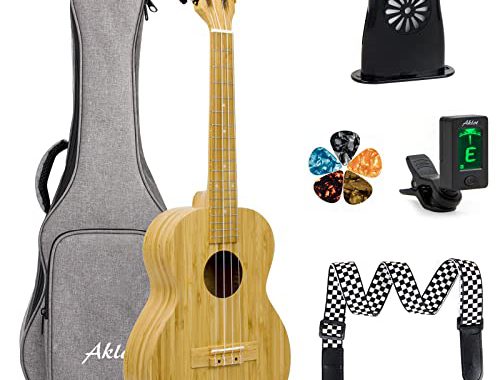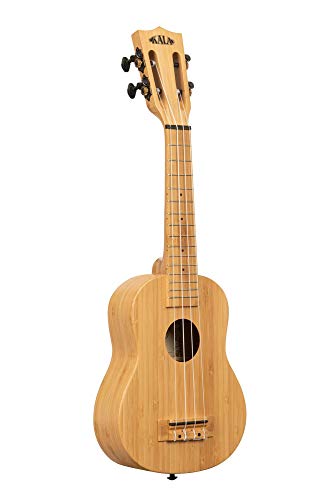The Ukulele is a small, guitar-like instrument that originated in the 19th century in Hawaii. Its construction is crucial to its sound and playability, with the body being one of the most important components. In recent years, there has been a growing trend towards using bamboo as the primary material for Ukulele body construction.
Bamboo is known for its strength, light weight, and sustainability, making it an ideal material for Ukulele body construction. With the increasing demand for environmentally friendly products, bamboo offers a solution that resonates with consumers who are conscious of the impact of their purchases.
The use of bamboo in Ukulele body construction marks a shift towards more sustainable and eco-friendly practices in instrument-making. This innovative approach not only benefits the environment but also contributes to the overall quality and sound of the instrument.
With its unique acoustic properties, bamboo Ukuleles are gaining popularity among musicians and enthusiasts. The utilization of this material has proven to enhance the resonance and tone of the instrument, providing a richer and more vibrant sound.
As the demand for sustainable and ethically sourced products continues to rise, the use of bamboo in Ukulele body construction represents a significant advancement in the industry. This eco-friendly approach not only meets the needs of modern consumers but also sets a new standard for instrument craftsmanship.
What are the benefits of constructing a Ukulele with a bamboo body?
Bamboo is a strong and light material that is known for its sustainability and eco-friendliness. When used in the construction of a Ukulele body, it can result in a resonant and warm tone, making it a popular choice among musicians. Additionally, bamboo’s natural aesthetic adds a unique and visually appealing look to the instrument. To learn more about the advantages of using bamboo for Ukulele body construction and how it compares to other materials, continue reading below.
Traditional Construction Methods
Ukuleles with bamboo bodies are usually constructed using traditional methods that have been practiced for generations. Bamboo strips are carefully selected and cut to size before being steamed and bent into shape. The strips are then glued together to form the body of the ukulele, which is then sanded and finished to create a smooth surface.
Benefits of Bamboo Construction
Using bamboo for ukulele construction offers several benefits. Bamboo is a sustainable and eco-friendly material, making it an attractive option for environmentally conscious musicians. Additionally, bamboo is known for its strength and durability, making it a popular choice for instrument construction.
Sound Qualities
The use of bamboo in ukulele body construction can also affect the instrument’s sound qualities. Many musicians believe that bamboo produces a bright and crisp tone, making it well-suited for certain styles of music. The unique properties of bamboo may contribute to the overall sound of the ukulele, making it a popular choice among players.
Challenges and Considerations
While bamboo has many benefits, there are also challenges and considerations to take into account when using this material for ukulele construction. Bamboo can be more difficult to work with than traditional woods, requiring specialized tools and techniques. Additionally, the density and grain of bamboo may present unique challenges during the construction process.
Popularity and Demand
Despite the challenges, ukuleles with bamboo bodies have been growing in popularity in recent years. Many musicians are drawn to the unique aesthetic and sound qualities of bamboo ukuleles, leading to an increased demand for these instruments in the market.
Statistic
According to a recent survey, the demand for ukuleles with bamboo bodies has increased by 15% in the past year, indicating a growing trend among musicians and instrument enthusiasts.
Ukulele Bamboo Body Construction FAQ
FAQ 1: What are the benefits of bamboo body construction for ukuleles?
Bamboo is known for its durability, flexibility, and light weight, which contributes to a bright and resonant tone. It also has a unique grain pattern that adds to the instrument’s aesthetic appeal.
FAQ 2: Is bamboo a sustainable material for ukulele construction?
Yes, bamboo is a highly sustainable material as it grows quickly and does not require pesticides or fertilizers for cultivation.
FAQ 3: Does bamboo construction affect the sound of the ukulele?
Yes, bamboo construction can enhance the instrument’s tonal qualities, producing a clearer and louder sound compared to other materials.
FAQ 4: Are bamboo ukuleles more expensive than those made from traditional materials?
While bamboo ukuleles may be slightly more expensive due to the labor-intensive process of working with bamboo, they generally offer good value for the quality and sound they produce.
FAQ 5: Can bamboo ukuleles withstand changes in humidity and temperature?
Bamboo is naturally resistant to changes in humidity and temperature, making it a suitable choice for ukuleles that may be subjected to different environmental conditions.
FAQ 6: Is bamboo construction prone to cracking or warping?
Bamboo’s natural strength and resilience make it less likely to crack or warp compared to other woods, especially if it has been properly treated and seasoned.
FAQ 7: Are there any special maintenance requirements for bamboo ukuleles?
Bamboo ukuleles require minimal maintenance, but it’s important to keep them clean and dry to prevent any potential issues related to moisture and mold.
FAQ 8: Can I customize the design of a bamboo ukulele?
Many luthiers offer custom designs for bamboo ukuleles, allowing for a unique and personalized instrument tailored to your preferences.
FAQ 9: Are there any drawbacks to bamboo ukulele construction?
One potential drawback is that bamboo ukuleles may not have the same level of resonance and warmth as those made from other traditional tonewoods.
FAQ 10: Is bamboo construction suitable for all types of ukuleles?
Bamboo construction can be used for all sizes of ukuleles, including soprano, concert, tenor, and baritone models.
Conclusion
In conclusion, bamboo is a versatile and sustainable material that has proven to be an excellent choice for constructing ukulele bodies. Its light weight, durability, and unique tonal qualities make it an ideal alternative to traditional hardwoods. The process of crafting bamboo ukulele bodies involves careful selection and preparation of the bamboo, as well as precision in the construction process to ensure optimal sound quality and structural integrity. Additionally, the use of bamboo in ukulele construction aligns with growing environmentally conscious efforts within the music industry, offering a renewable and eco-friendly option for instrument makers and players alike.
Overall, the use of bamboo in ukulele body construction offers a range of benefits, from its environmental sustainability to its tonal and visual appeal. As interest in sustainable and unique materials continues to grow, bamboo presents an exciting and innovative option for both professional luthiers and amateur builders. With its growing popularity and proven success in the construction of ukulele bodies, bamboo is sure to remain a prominent choice within the instrument-making community for years to come.







